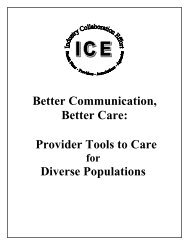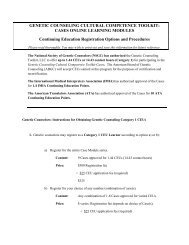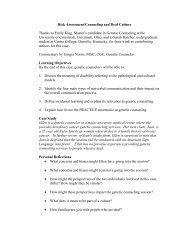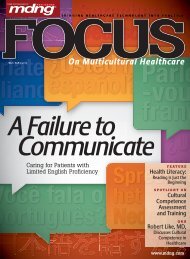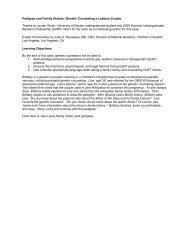Advanced Effective Communication, Cultural Competence, and ...
Advanced Effective Communication, Cultural Competence, and ...
Advanced Effective Communication, Cultural Competence, and ...
Create successful ePaper yourself
Turn your PDF publications into a flip-book with our unique Google optimized e-Paper software.
Appendix E<br />
RESOURCE GUIDE<br />
Appendix E contains many Web sites, toolkits, articles, <strong>and</strong><br />
other information that can serve to inform the development of<br />
practices that best meet diverse patient needs, support quality<br />
<strong>and</strong> safety, <strong>and</strong> aid in compliance with law, regulation <strong>and</strong><br />
accreditation st<strong>and</strong>ards. This is by no means an exhaustive list,<br />
<strong>and</strong> inclusion should not be considered an endorsement, as the<br />
authors have not undertaken any evaluation of these resources.<br />
The resources in this appendix correspond to the five domains<br />
in Chapter 6: Organization Readiness <strong>and</strong> are divided into<br />
the following categories.<br />
1. Leadership Domain (page 77)<br />
• Organization Assessment Using Frameworks, Tools,<br />
<strong>and</strong> Guidelines<br />
2. Data Collection <strong>and</strong> Use Domain (page 79)<br />
• Collecting <strong>and</strong> Using Patient- <strong>and</strong> Community-Level<br />
Data for Service Planning<br />
3. Workforce Domain (page 80)<br />
• Working with an Interpreter<br />
• <strong>Cultural</strong> Competency Training<br />
• Competencies for Interpreters <strong>and</strong> Translators<br />
4. Provision of Care, Treatment, <strong>and</strong> Services Domain<br />
(page 82)<br />
• Improving Overall Patient–Provider <strong>Communication</strong><br />
• Developing Language Access Services for Patients Who<br />
Speak a Language Other Than English<br />
• Translating Materials into Other Languages <strong>and</strong><br />
Sources for Materials in Other Languages<br />
• Respecting, Underst<strong>and</strong>ing, <strong>and</strong> Addressing <strong>Cultural</strong><br />
Beliefs<br />
• Addressing Religious <strong>and</strong> Spiritual Beliefs <strong>and</strong> Practices<br />
• Addressing the Needs of Patients with Disabilities<br />
• Addressing the Needs of Patients with Physical or<br />
Cognitive <strong>Communication</strong> Needs<br />
• Addressing the Needs of Patients Who Are Blind or<br />
Have Low Vision<br />
• Addressing the Needs of Patients Who Are Deaf or<br />
Hard of Hearing<br />
• Addressing Health Literacy Needs<br />
• Addressing the Needs of Lesbian, Gay, Bisexual, <strong>and</strong><br />
Transgender Patients<br />
• Providing Care at the End of Life<br />
• <strong>Cultural</strong> Competency Materials for Specific Populations<br />
or Conditions<br />
5. Patient, Family, <strong>and</strong> Community Engagement Domain<br />
(page 89)<br />
• Encouraging Patient <strong>and</strong> Family Engagement<br />
• Engaging the Community<br />
Many areas overlap. To prevent duplication, we have tried to<br />
list items only once, under the section for which the resource<br />
would most likely be sought. The resources provided here are<br />
accurate as of May 2010.<br />
Leadership Domain<br />
Organization Assessment Using<br />
Frameworks, Tools, <strong>and</strong> Guidelines<br />
1. The Patient- <strong>and</strong> Family-Centered Care Organizational Self<br />
Assessment Tool was developed by the Institute for Healthcare<br />
Improvement in conjunction with the National Initiative for<br />
Children’s Healthcare Quality. It allows organizations to<br />
underst<strong>and</strong> the range <strong>and</strong> breadth of patient- <strong>and</strong> familycentered<br />
care elements <strong>and</strong> to assess where they are regarding<br />
the leading edge of practice. Available at http://www.ihi.org/<br />
IHI/Topics/PatientCenteredCare.<br />
2. The Department of Health <strong>and</strong> Human Services Office of<br />
Minority Health’s National St<strong>and</strong>ards for <strong>Cultural</strong>ly <strong>and</strong><br />
Linguistically Appropriate Services in Health Care (CLAS)<br />
was developed with the input of a panel of experts. These<br />
14 st<strong>and</strong>ards have been used by many hospitals <strong>and</strong> health<br />
care organizations to help guide their efforts to provide<br />
77



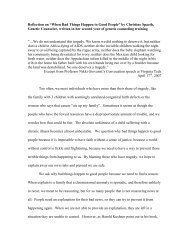
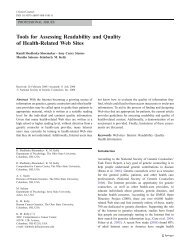

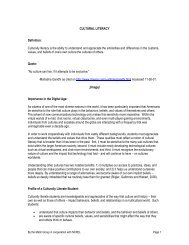
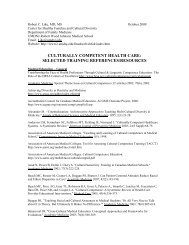
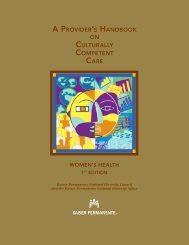
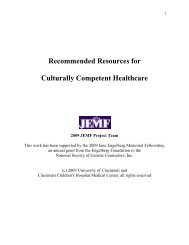
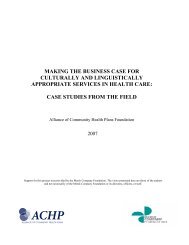
![Breaking Bad News PPT[1] - Genetic Counseling Cultural ...](https://img.yumpu.com/35003134/1/190x146/breaking-bad-news-ppt1-genetic-counseling-cultural-.jpg?quality=85)
